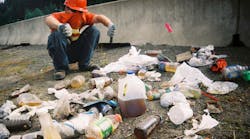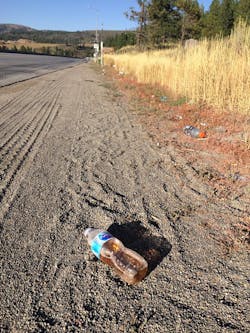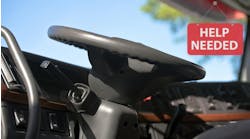California Facebook post on ‘trucker bombs’ spurs thousands of comments
When the California Highway Patrol in early September posted on Facebook photos of “trucker bombs” and related human waste at Donner Pass, officials could not have predicted that it would have garnered over 3,000 comments and counting.
The Facebook post stated: "We are having a major problem with trucks parking on the freeway and leaving behind absolutely disgusting items of trash." Referring to the accompanying photos, it continued, "Yes, that bottle is full of urine and yes, the bags are full of solid human waste. WE ARE CITING drivers for 21718 VC (non-emergency stop on the freeway) and littering."
CHP Officer Anne Morin of the Donner Pass Commercial Vehicle Enforcement Facility, could not say who at her agency put up the post, but noted, "It's something that is obviously noticeable to the point where somebody felt it was compelling enough to take a picture of, felt it was compelling enough to post on Facebook to say 'hey, hold onto this, go down the road to the rest area, dispose of it properly and not toss it out the window where it becomes a health hazard.' "
Morin emphasized: "This is not new enforcement. It's something that we are constantly looking at. It's a disgusting issue for anybody to have to deal with. It's a real issue."
Morin was careful not to blame truck drivers for all of the disgusting messes left along highways and rest areas because she knows campers and motorists add to the problem. However, she said the post has produced a lively discussion on Facebook. "There are drivers out there that came in to comment. They're like, 'hey, I dispose of my waste properly in a trash receptacle' or whatnot. It has produced an interesting discussion.' "
A look through the comments makes it clear that the issue is a hot button for drivers. Many of the comments were angry and venomous. Some drivers blame the lack of parking and restroom facilities while others chide their fellow drivers for putting the profession in a bad light by not disposing of waste properly. It's also apparent that many drivers see trucker bombs as part of industry lore, as old as the profession, even citing country songs that immortalize the phenomenon (See: Trucker Bomb by Whiskey Daredevil).
Other states are grappling with the issue, too. However, of the half-dozen states contacted by Fleet Owner, only a few would talk on the record.
An official of the Kansas Department of Transportation said the problem is not only unsightly, but a health hazard to road crews who you might not expect to be impacted.
The official wrote in an e-mail: "Truck driver bombs are a problem in Kansas. They are especially problematic for mowing staff who are on mowers without windshields to protect them from the eruption of those unexpected gross and unsanitary waste droppings. No one should have to endure those body fluid discards. Instead all drivers should avoid littering by disposing of their own trash and waste at a truck stop in a trash receptacle."
Another official who would discuss the matter is Peter Christiansen, who works for the Washington Department of Ecology. He said that a few years ago a television station wanted to do a story about trucker bombs, so the agency arranged to meet the broadcast crew.
"The Snoqualmie Pass is on I-90, which is the east-west interstate. Right off Snoqualmie Pass, it's coming down Snoqualmie pass, it's after you've gotten all through the snow when you take off your chains and stuff, there's an exit. And all the truckers tend to go off there to take their chains off, and they also drop all their bottles and other stuff there. We went up there to do a demonstration pickup, and it was amazing the stuff was out there. There were buckets, five-gallon buckets," he said. "There were hundreds upon hundreds of bottles, and it was mind blowing. And the thing is, no more than five miles down the road was a rest stop where if they want, they could have stopped and taken their bottles and put them into the bathroom or a garbage can there. But since they had already stopped there, they weren't going to make the second stop. I don't understand the psychology."
He added: "I'm not saying 'don't use the bottles.' I understand that's an occupational necessity. All I'm saying is properly dispose of them."
Christensen said that his agency is hoping to receive additional program funding and he would like a trucker litter campaign to be part of it.
The question is how to approach drivers. "We would like to work with trucker organizations and the folks doing the driving. Maybe there are national organizations to get a positive message out that says: 'We understand the predicament you're in but please don't litter.' Our goal is not to shame people."





